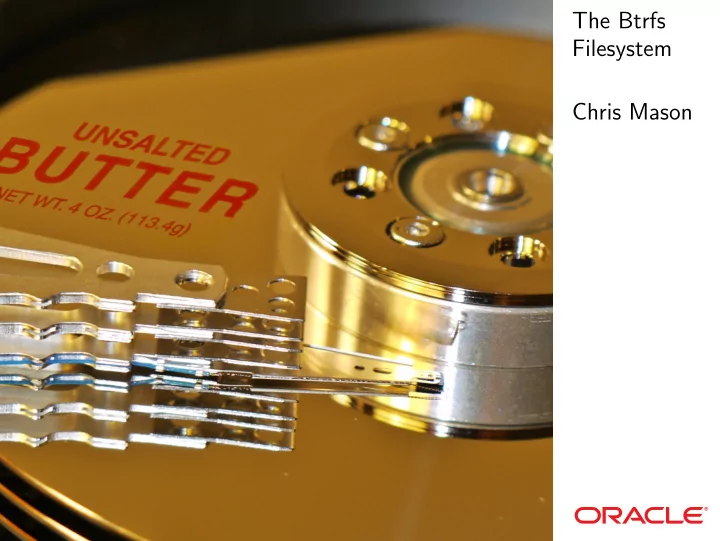

The Btrfs Filesystem Chris Mason
The Btrfs Filesystem • Jointly developed by a number of companies Oracle, Redhat, Fujitsu, Intel, SUSE, many others • All data and metadata is written via copy-on-write • CRCs maintained for all metadata and data • Efficient writable snapshots • Multi-device support • Online resize and defrag • Transparent compression • Efficient storage for small files • SSD optimizations and trim support
Btrfs Progress • Extensive performance and stability fixes • Significant code cleanups • Efficient free space caching across reboots • Delayed metadata insertion and deletion • Background scrubbing • New LZO compression mode • New Snappy compression mode in development • Batched discard (fitrim ioctl) • Per-inode flags to control COW, compression • Automatic file defrag option • Focus on stability and performance
Logging Improvements • Btrfs fsck log was rewriting some items over and over again • New code from Fujitsu bumps the metadata generation numbers inside a transaction • Cuts down log traffic by 75% • Will go into 3.2 merge window
Metadata Fragmentation • Btrfs btree uses key ordering to group related items into the same metadata block • COW tends to fragment the btree over time • Larger blocksizes lower metadata overhead and improve performance • Larger blocksizes provide very inexpensive btree defragmentation • Ex: Intel 120GB MLC drive: 4KB Random Reads – 78MB/s 8KB Random Reads – 137MB/s 16KB Random Reads – 186MB/s • Code queued up for Linux 3.3 allows larger btree blocks
Scrub • Btrfs CRCs allow us to verify data stored on disk • CRC errors can be corrected by reading a good copy of the block from another drive • New scrubbing code scans the allocated data and metadata blocks (Arne Jansen) • Any CRC errors are fixed during the scan if a second copy exists • Will be extended to track and offline bad devices • (Scrub Demo)
Discard/Trim • Trim and discard notify storage that we’re done with a block • Btrfs now supports both real-time trim and batched • Real-time trims blocks as they are freed • Batched trims all free space via an ioctl
Drive Swapping • GSOC project • Current raid rebuild works via the rebalance code • Moves all extents into new locations as it rebuilds • Drive swapping will replace an existing drive in place • Uses extent-allocation map to limit the number of bytes read • Can also restripe between different RAID levels
Efficient Backups • Advanced btrfs send/receive tool in development (Jan Schmidt) • Transmits in a neutral format so corruptions are not duplicated
Embedded Systems • Btrfs is fairly friendly to small machines • Btrfs is not quite as friendly to small disks But this is getting better • Btrfs works very well overall on low end flash
RAID 5/6 • Initial implementation from Intel some time ago • Merge pending completion of fsck work • Will also add triple mirroring • Mixed raid modes for metadata and data are included
When Bad Things Happen to Good Data • Beta filesystem recovery tool from Josef Bacik Risk free – copies data out of the corrupt FS • tree root history log to recover from many hardware errors • New fsck releases on the way to repair in place • git://git.kernel.org/pub/scm/linux/kernel/git/mason/btrfs-progs.git recovery-beta • (demo)
Billions of Files? • Dramatic differences in filesystem writeback patterns • Sequential IO still matters on modern SSDs • Btrfs COW allows flexible writeback patterns • Ext4 and XFS tend to get stuck behind their logs • Btrfs tends to produce more sequential writes and more random reads
File Creation Benchmark Summary 180000 • Btrfs duplicates metadata Btrfs SSD XFS SSD by default 160000 Ext4 SSD Btrfs 2x the writes XFS 140000 Ext4 • Btrfs stores the file name 120000 three times 100000 Files/sec • Btrfs and XFS are CPU bound on SSD 80000 60000 40000 20000 0
File Creation Throughput 160 140 Btrfs XFS Ext4 120 100 MB/s 80 60 40 20 0 0 45 90 135 180 225 270 315 330 Time (seconds)
IOPs 12000 10500 Btrfs XFS Ext4 9000 7500 IO / sec 6000 4500 3000 1500 0 0 45 90 135 180 225 270 315 Time (seconds)
IO Animations • Ext4 is seeking between a large number of disk areas • XFS is walking forward through a series of distinct disk areas • Both XFS and Ext4 show heavy log activity • Btrfs is doing sequential writes and some random reads
Thank You! • Chris Mason < chris.mason@oracle.com > • http://btrfs.wiki.kernel.org
Recommend
More recommend